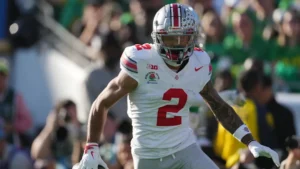
In the world of college football, few programs have experienced as much fluctuation in performance, ambition, and glory as Louisiana State University (LSU). The Tigers have long been a force to reckon with in the Southeastern Conference (SEC) and on the national stage, consistently competing for championships and earning recognition among the elite programs in the country. Over the years, LSU’s success has been shaped by a combination of factors, from strong recruiting, robust player development, effective coaching, and a loyal fanbase, to the undeniable competitive nature of the SEC itself.
The evolution of LSU football, especially in recent decades, has been particularly remarkable. The Tigers’ resurgence as a powerhouse, particularly following the turn of the 21st century, has been a testament to their ability to rebuild, adapt, and rise to the top. Not only has LSU achieved considerable success in the polls, but it has also claimed multiple national championships, earned consistent bowl berths, and produced a remarkable pipeline of NFL talent.
In this essay, we will examine LSU’s rise to prominence in the college football world, particularly focusing on their continued success in the national rankings, with an emphasis on their performance in recent seasons. We will analyze the various elements that have contributed to this ascension, explore some key players and coaches who have been pivotal to the program’s growth, and highlight the challenges and opportunities LSU faces as it competes to remain at the top of the college football landscape.
Early Struggles and the Foundation for Success
To understand how LSU football came to be consistently ranked among the top teams in the nation, it is important to examine the early years of the program. LSU’s football history dates back to 1893, but it wasn’t until the mid-20th century that the Tigers began to gain a solid reputation. The team’s first real period of dominance came under head coach Paul Dietzel in the late 1950s and early 1960s, when LSU won its first national championship in 1958. However, after that championship, the program struggled to maintain consistent success.
LSU’s rise from mediocrity can largely be attributed to a few key factors that laid the groundwork for the program’s future success. The hiring of head coach Nick Saban in 2000 marked the turning point for LSU football. Saban, known for his meticulous attention to detail and disciplined approach, brought a winning culture to Baton Rouge. Under his leadership, LSU quickly became one of the most feared teams in the SEC, culminating in a national championship in 2003.
Saban’s success at LSU, however, was just the beginning of what would become a dynasty of sorts. His eventual departure to Alabama in 2007 led to the hiring of Les Miles, who would lead the Tigers to another national championship in 2007, further cementing LSU’s reputation as one of the most consistent and successful programs in the country.
Nick Saban’s Impact on LSU and the SEC
When Nick Saban took over as LSU’s head coach in 2000, the program was in a rebuilding phase. The Tigers had some talent, but they lacked the depth and structure that would be necessary to compete at the highest levels of college football. Saban, however, had a clear vision of what he wanted the program to become, and his leadership quickly transformed LSU into an elite contender.
One of the key strategies that Saban implemented was an emphasis on recruiting. Under his leadership, LSU began to secure some of the best talent in the country, particularly from Louisiana, which is known for producing top-tier football players. Saban also focused on building a defense-first philosophy, which would become the hallmark of LSU football. His 2003 team, led by quarterback Matt Mauck, running back Joseph Addai, and a stifling defense, won LSU’s first national championship in 45 years.
Saban’s tenure at LSU was brief, lasting only five years, but the foundation he laid in Baton Rouge would pay off for years to come. After his departure for Alabama, Saban’s successor, Les Miles, was able to build on the culture of success that Saban had cultivated. Miles, known as “The Mad Hatter,” continued LSU’s dominance in the SEC and led the Tigers to another national championship in 2007. Despite not winning as many championships as Saban did at Alabama, Miles’ tenure was a period of sustained success for LSU, as the Tigers regularly finished near the top of the polls.
Les Miles and the Continued Success of LSU Football
Les Miles took over as LSU’s head coach in 2005, just two years after Saban’s departure. While Miles was a different personality than his predecessor, he continued to emphasize the key elements that made LSU successful: strong defense, a run-heavy offense, and recruiting. Miles’ approach brought LSU continued success, as the Tigers were consistently ranked in the top 10 and regularly competed for SEC championships.
In 2007, Miles’ LSU team captured the national championship, defeating Ohio State in the BCS National Championship Game. The 2007 season was a defining moment in LSU’s history, as the Tigers not only won the national title but did so in dramatic fashion, overcoming multiple setbacks throughout the season. LSU was one of the most balanced teams in the country, with an explosive offense led by quarterback Matt Flynn and running back Jacob Hester, along with a defense that featured future NFL stars like Glenn Dorsey and Darrelle Revis.
Despite this success, however, Miles’ later years at LSU were marked by some inconsistencies, and by 2016, the program was in need of a fresh start. While LSU remained a competitive team under Miles, the Tigers were unable to consistently challenge for SEC titles and national championships in the same way they had during their peak years.
The Ed Orgeron Era and the 2019 National Championship
In 2016, LSU made the decision to part ways with Les Miles, and the program hired Ed Orgeron as the head coach. Orgeron, known for his passionate demeanor and deep ties to Louisiana, was initially seen as an unconventional choice. However, his work in rebuilding the Tigers’ program and leading them to a national championship in 2019 is now seen as one of the defining moments in LSU football history.
Orgeron’s success was built on several key factors, including his ability to recruit elite talent, particularly on defense, and his decision to overhaul LSU’s offensive philosophy. In 2019, the Tigers were led by a dynamic offense that featured quarterback Joe Burrow, who would go on to win the Heisman Trophy and become the first overall pick in the 2020 NFL Draft. Burrow’s transformation under Orgeron and offensive coordinator Joe Brady was nothing short of remarkable. The LSU offense, which had long been known for its conservative, run-heavy approach, became one of the most explosive units in college football history.
With Burrow leading the charge, LSU’s offense averaged over 50 points per game in 2019, and the team steamrolled through the regular season, defeating several top-ranked teams, including Alabama. In the College Football Playoff, LSU defeated Oklahoma and Clemson to win its fourth national championship. The 2019 team is widely regarded as one of the best in college football history.
Despite Orgeron’s success in 2019, LSU’s performance in the following seasons has been more uneven. In 2020, the Tigers experienced a significant drop-off in performance, in part due to the challenges posed by the COVID-19 pandemic, the loss of key players, and a lack of depth. Orgeron was eventually let go after the 2021 season, marking the end of his tenure at LSU.
Brian Kelly’s Arrival and LSU’s Continued Rise
In 2022, LSU hired Brian Kelly, formerly the head coach at Notre Dame, to lead the program. Kelly, a proven winner with a long track record of success at Notre Dame, was tasked with returning LSU to national prominence after a period of instability. While Kelly’s first season was a transition year, the Tigers showed significant improvement, culminating in an SEC West title and a spot in a major bowl game.
Kelly’s ability to recruit, build a disciplined team, and implement a modern offensive and defensive strategy has already begun to pay dividends. Under his leadership, LSU continues to climb the rankings, positioning itself once again as a legitimate contender for both SEC and national titles. The 2023 season saw LSU return to the top of the polls, with the Tigers emerging as one of the most exciting and talented teams in college football.
The Future of LSU Football
LSU’s rise to prominence in the college football polls is far from over. With a strong recruiting class, a commitment to player development, and a program that consistently competes in one of the toughest conferences in the country, the Tigers are poised to remain a dominant force in college football for years to come. Brian Kelly’s leadership will be critical as LSU continues to build on its success and strives for more championships in the future.
The key to LSU’s continued success will be its ability to adapt to the changing landscape of college football, from the ever-evolving recruiting dynamics to the growing influence of the transfer portal and name, image, and likeness (NIL) deals. However, with its rich tradition, passionate fanbase, and proven track record, LSU is well-positioned to continue rising near the top of the polls for years to come.
In conclusion, LSU’s rise to the top of the college football rankings has been a product of decades of hard work, consistency, and a commitment to excellence. The program’s success in recent years, particularly under the leadership of Nick Saban, Les Miles, Ed Orgeron, and Brian Kelly, demonstrates the ability of LSU to adapt to the changing landscape of college football while remaining one of the most competitive programs in the country. As the Tigers continue to rise near the top





